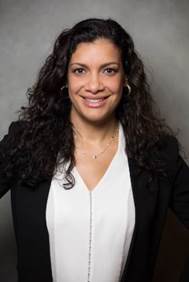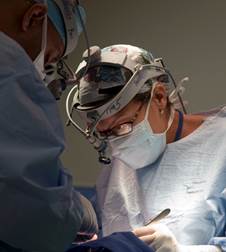
 What brought you to your field of expertise? Becoming a surgeon was something I did not plan for, and even though it was suggested early to me in medical school, I thought 'no way! that kind of lifestyle is not for me.' However, during my clinical rotations it was quickly apparent how exciting surgery was to me and I naturally fell right in line with the schedule, hours and OR. I laugh when I look back and think about how things worked out - because I certainly have the personality of a surgeon!
What brought you to your field of expertise? Becoming a surgeon was something I did not plan for, and even though it was suggested early to me in medical school, I thought 'no way! that kind of lifestyle is not for me.' However, during my clinical rotations it was quickly apparent how exciting surgery was to me and I naturally fell right in line with the schedule, hours and OR. I laugh when I look back and think about how things worked out - because I certainly have the personality of a surgeon!
What do you find most satisfying about the work that you do? The two most satisfying aspects of my work is helping Latino/Spanish speaking patients navigate the healthcare system and understand their health, as well as mentor the next generation of students and trainees. It is through both of these roles that I remain connected and passionate about my career as a surgeon.
Do you have a woman role model? Who? Why? I do not have a specific woman role model per se, but I would say that many women have influenced my career path. In high school, it was my chemistry teacher, who challenged me and encouraged me to pursue a degree in Chemistry. In medical school, it was a transplant surgeon who explained how it was completely possible to be a surgeon AND still have a family. As someone raised with a stay-at-home Mom, that wisdom reassured me I didn't have to sacrifice my personal life for surgery. In fellowship, it was two attendings who modeled what that 'balance' between surgery and family life actually looked like. After training, I have been fortunate to have several women promote, support, and encourage me, all of which have been key to my professional success.
What would you consider to be your greatest accomplishment?
My greatest professional accomplishment is being the first member of my family to become a physician. Coming from a background with two Puerto Rican parents who married young and worked very hard to instill in myself and my siblings that we could do anything, I am very proud of this. Personally, my greatest accomplishments are my three wonderful children – they are an absolute joy, and I feel very blessed to be their mother.
What would you consider to be your greatest challenge? I still work in a male-dominated field with limited diversity. As a woman of color, there are still many  challenges in the field of surgery with respect to equity in pay, leadership opportunities and the ability to develop a national reputation. It can be very challenging to find someone who looks like me and who can relate to my experiences.
challenges in the field of surgery with respect to equity in pay, leadership opportunities and the ability to develop a national reputation. It can be very challenging to find someone who looks like me and who can relate to my experiences.
What are a few resources you would recommend to other women in the field of medicine and science?
Locally at Rutgers, I participated and thoroughly enjoyed the OASIS Leadership and Professional Development Program. It's a wonderful program which provides coaching, peer mentorship, leadership skills, etc. and includes an emphasis on communication skills and awareness of how one is perceived when communicating. For someone specifically in the field of surgery, the American College of Surgeons Women in Surgery Committee offers a mentorship program which pairs a mentee with a senior mentor based on the mentee's needs (professional or personal) – I was paired with an extremely successful colorectal surgeon who provided such insight into promotion, dealing with surgical complications, time management and prioritizing commitments. It really made a difference for how I approach my work.
What strategies would you recommend to other women in science/medicine for improving their work – life balance?
My two pieces of advice are first, know there is no such thing as work-life balance. As Oprah Winfrey said it best, 'you can have it all, just not all at once.' For me, that means there are times when work is at the forefront and other times when my personal life takes the front seat. I am very fortunate to have a supportive husband who respects and supports that. Second, outsource what you can within your means – why women are still expected to be experts in their careers, fashion, cooking and managing a household is something I find both absurd and comical. If you are a great cook, excellent! If not, get someone to help you get healthy, tasty meals on your dinner table.
What advice would you give a woman going into a medical or scientific leadership role for the first time?
Find your allies and make sure you have regular interactions to get their perspective and honest input. It is so important to purposely surround yourself with people who value you and your success.
What do you do to continue to grow and develop in your field?
I participate in regular professional development activities to continue to grow my leadership skills and expand upon my capabilities as a surgeon, educator, and role model. I also actively participate in several surgical societies as a way to stay current in advancements in colorectal surgery. Additionally, over the past couple of years I have started using social media to remain aware of newly released research and to disseminate information on colorectal cancer screening and other topics important to both colorectal surgery and surgical education.
What strength or characteristic do you have that contributes most to your professional success?
I am extremely motivated and driven, and while that can sometimes lead to me being stretched a bit thin, it allows me to ensure I am always striving to work at my highest level – this in turn ensures I put my best effort into any role or project I am working on, as well as provide the best care for my patients.
